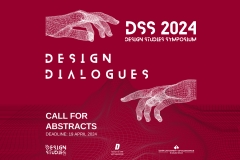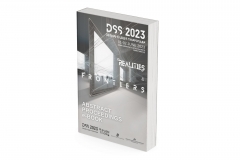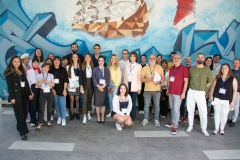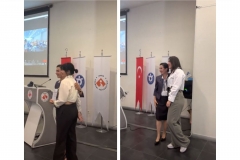
GRADUATE SCHOOL
Design Studies (With Thesis)
FFD 505 | Course Introduction and Application Information
| Course Name |
Design Seminar
|
|
Code
|
Semester
|
Theory
(hour/week) |
Application/Lab
(hour/week) |
Local Credits
|
ECTS
|
|
FFD 505
|
Fall
|
3
|
0
|
3
|
7.5
|
| Prerequisites |
None
|
|||||
| Course Language |
English
|
|||||
| Course Type |
Required
|
|||||
| Course Level |
Second Cycle
|
|||||
| Mode of Delivery | - | |||||
| Teaching Methods and Techniques of the Course | DiscussionQ&ACritical feedbackLecture / Presentation | |||||
| Course Coordinator | ||||||
| Course Lecturer(s) | ||||||
| Assistant(s) | - | |||||
| Course Objectives | The main objective of this course is to introduce to students the broad field of design, help them focus on their research areas, and lead them to start problematizing their respective thesis topics. Towards this end, this seminar course consists of readings and discussions on the broad field of design, and presentations and lectures by the members of the Faculty of Fine Arts and Design on their respective areas of research interest. |
| Learning Outcomes |
The students who succeeded in this course;
|
| Course Description | The unique characteristic of the Faculty and the Graduate program, that is, the integration among design fields, is the essence of approach in this seminar course. The approach to design as the all-encompassing concept that unites the thoughts and practices that have to do with the act of organizing and creating the entities around us, is the main content of this seminar course. |
|
|
Core Courses |
X
|
| Major Area Courses | ||
| Supportive Courses | ||
| Media and Management Skills Courses | ||
| Transferable Skill Courses |
WEEKLY SUBJECTS AND RELATED PREPARATION STUDIES
| Week | Subjects | Related Preparation |
| 1 | Module I: Introduction to the course. Discussion on libraries and archives. Announcement of Assignment I. | Assignment I: Identification of the course program of FFAD, lecturers of FFAD, a research field, five related keywords, at least three libraries and archives in İzmir and two digital archives from the web. |
| 2 | Module I: Discussion on libraries, archives and also plagiarism, Turnitin and academic referencing styles. Announcement of Assignment II. | Assignment II: Reading and preparing presentation on historiography and methodology. |
| 3 | Module I: Individual and group presentations on historiography and methodology. Announcement of Assignment III. | Assignment III: Book review |
| 4 | Module I: Presentation on book reviews and in-class discussions on book reviews. Announcement of Module II and Assignment IV. | Assignment IV: Bibliography. Identification of articles, book chapters, books and conference papers. Obtainment of at least one document from each archive. |
| 5 | Module II: Individual research on Assignment IV. In-class critiques. Announcement of Assignment V. | Assignment V: Preparation of an initial research proposal (1500 words) based on the previous data. Identification of one main and one back-up supervisor. Identification of their relation and contribution to the research field. |
| 6 | Module II: Submission of Assignment IV and in-class discussions. Announcement of Module III and Assignment III. | Assignment V: Identification of the related items from the presentations of the guest speakers. Building of the proposal (2500 words). Extension of the bibliography. |
| 7 | Module III: Guest speaker 1 | Development of Assignment III. |
| 8 | Module III: Guest speaker 2 | Development of Assignment III. |
| 9 | Module III: Guest speaker 3 | Development of Assignment III. |
| 10 | Module III: Guest speaker 4. | Development of Assignment III. |
| 11 | Module III: Submission of Assignment III and in-class discussions. Announcement of Module IV and the Final Assignment IV. | Assignment IV: Improve the research proposal (2500 – 3000 words). Prepare a final presentation of the research proposal. |
| 12 | Module IV: Preparation of Assignment IV and in-class discussions. | Development of Assignment IV. |
| 13 | Module IV: Preparation of Assignment IV and in-class discussions. | Development of Assignment IV. |
| 14 | Module IV: Submission of Assignment IV and Final Presentation. Guest speakers are invited as jurors. | Finalize Assignment IV. Submission of the research proposal and its presentation. |
| 15 | Review of the semester | |
| 16 | Review of the semester |
| Course Notes/Textbooks |
|
| Suggested Readings/Materials |
|
EVALUATION SYSTEM
| Semester Activities | Number | Weigthing |
| Participation |
1
|
10
|
| Laboratory / Application | ||
| Field Work | ||
| Quizzes / Studio Critiques | ||
| Portfolio | ||
| Homework / Assignments |
3
|
60
|
| Presentation / Jury |
1
|
30
|
| Project | ||
| Seminar / Workshop | ||
| Oral Exams | ||
| Midterm | ||
| Final Exam | ||
| Total |
| Weighting of Semester Activities on the Final Grade |
5
|
100
|
| Weighting of End-of-Semester Activities on the Final Grade | ||
| Total |
ECTS / WORKLOAD TABLE
| Semester Activities | Number | Duration (Hours) | Workload |
|---|---|---|---|
| Theoretical Course Hours (Including exam week: 16 x total hours) |
16
|
3
|
48
|
| Laboratory / Application Hours (Including exam week: '.16.' x total hours) |
16
|
0
|
|
| Study Hours Out of Class |
13
|
5
|
65
|
| Field Work |
0
|
||
| Quizzes / Studio Critiques |
0
|
||
| Portfolio |
0
|
||
| Homework / Assignments |
3
|
25
|
75
|
| Presentation / Jury |
1
|
37
|
37
|
| Project |
0
|
||
| Seminar / Workshop |
0
|
||
| Oral Exam |
0
|
||
| Midterms |
0
|
||
| Final Exam |
0
|
||
| Total |
225
|
COURSE LEARNING OUTCOMES AND PROGRAM QUALIFICATIONS RELATIONSHIP
|
#
|
Program Competencies/Outcomes |
* Contribution Level
|
||||
|
1
|
2
|
3
|
4
|
5
|
||
| 1 | to be able to expand the practical knowledge gained in undergraduate programs with theoretical field of design research, |
X | ||||
| 2 | to be able to examine, interpret data and assess concepts and ideas with research methods of design theory and social sciences, |
X | ||||
| 3 | to be able to identify problems of design disciplines in times of global / environmental crisis and to be able to develop possible solutions for design practitioners, |
X | ||||
| 4 | to be able to expand knowledge on the history of material culture as it relates to design practices of the past, |
X | ||||
| 5 | to be able to promote research on local practices of everyday life and assess the outcome to implement design solutions, |
X | ||||
| 6 | to be able to facilitate interactions in between varied design disciplines and to promote collaborative work to solve complex problems, |
X | ||||
| 7 | to be able to process outcome of design research to be applied in design education, |
X | ||||
| 8 | to be able to instigate research on the new tools, technologies and materials of production in order to accelerate changes in design practices, |
|||||
| 9 | to be able to develop an ethical approach towards design professions in order to install social and environmental responsibilities, |
X | ||||
| 10 | to be able to use a foreign language for both chasing the scientific publication and developing proper communication with colleagues from other countries, in written and verbal ways. |
X | ||||
| 11 | to be able to use computer programs needed in the field design as well as information and communication technologies in advanced levels (“European Computer Driving Licence”, Advanced Level”). |
|||||
*1 Lowest, 2 Low, 3 Average, 4 High, 5 Highest
NEWS |ALL NEWS

DSS 2024 CALL FOR PAPERS | THEME: DESIGN DIALOGUES
DSS 2024 CALL FOR PAPERS THEME: DESIGN DIALOGUES The Design Studies Graduate Program and the Faculty of Fine Arts and Design at the Izmir

Abstract Proceedings e-Book for the Design Studies Symposium 2023 is available now!
The Design Studies Symposium 2023 (DSS 2023), organized in collaboration with İzmir University of Economics Graduate School Design Studies Master's and PhD

Design Studies Symposium 2023: Realities & Frontiers
The Design Studies Symposium 2023 (DSS 2023) organized by the IEU Graduate School Design Studies programs was held on 1-2 June, at

The Best Paper Award at the Design Studies Symposium 2023: Realities & Frontiers
The voting for the best presentation award at the Design Studies Symposium 2023 (DSS 2023) organized by the IEU Graduate School Design




